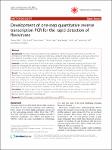Development of one-step quantitative reverse transcription PCR for the rapid detection of flaviviruses
Patel, Pranav
Landt, Olfert
Kaiser, Marco
Faye, Oumar
Koppe, Tanja
Lass, Ulrich
Sall, Amadou A.
Niedrig, Matthias
Background: The genus Flavivirus includes several pathogenic agents that cause severe illness in humans. Re-emergence of West Nile virus in Europe and continuous spread of certain flaviviruses such as dengue, yellow fever and Japanese encephalitis viruses represent a global danger to public health. Therefore, a rapid and accurate molecular method is required for diagnostics and epidemiological surveillance of flaviviruses. Methods: A Pan-Flavi quantitative RT-PCR assay using a Locked-Nucleic Acid probe targeting the flavivirus NS5 gene was developed and optimized to detect a wide range of flaviviruses simultaneously. The specificity and sensitivity of the Pan-Flavi assay were tested using RNA of different flaviviruses and non-flaviviruses. Furthermore, the assay was compared directly to flavivirus species-specific assays for the ability to detect flaviviruses sensitively. Results: Two degenerate primers and one Locked-Nucleic Acids probe were designed to amplify most of the flaviviruses. To increase the specificity and fluorescence signal of the Pan-Flavi assay for detection of yellow fever virus and dengue virus 4, additional primers and probes were included. Viral RNA of thirty different flaviviruses was detected, verifying the broad range specificity. The testing of this assay was successful, using standard plasmid and RNA dilutions of yellow fever virus vaccine strain, dengue virus 1 and tick-borne encephalitis virus, with a sensitivity limit of 10–100 genome copies/reaction. Also comparatively good results were achieved for detecting different flaviviruses by the Pan-Flavi assay when compared to the flavivirus species-specific assays. Conclusion: The assay is rapid, broad-range flavivirus-specific and highly sensitive making it a valuable tool for rapid detection of flaviviruses in livestock samples, epidemiological studies or as useful complement to single flavivirus-specific assays for clinical diagnosis.
Dateien zu dieser Publikation
Keine Lizenzangabe

